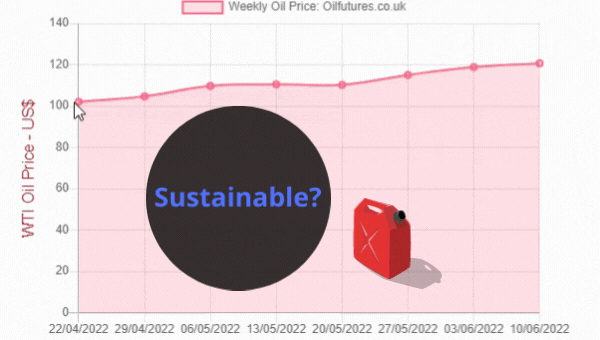It's all about the age-old adage, after all; what goes up, does come down - in the end.
The key players in the oil and gas industry, at boardroom level, now feel the current oil and gas prices are not sustainable, because the damage to the global economic growth is already there for all to see.
Harish Madhav, the CEO of Oil India, for instance, firmly believes that crude oil at $120 is not sustainable in the long run; he expect it to come down to $80 - $100 over medium term.
Mr Madhav, who heads a major oil company in the world's third largest consuming nation, is fully aware of the trials and tribulations of the industry in the country at present; the inflation, as in other major economies, is rising and its impact on the economic growth is obvious; the Indian government slashed the taxes on oil and gas at the expense of vital revenues for the coffers in order to keep the prices at the current level - as the last resort.
Although India too got on the bandwagon of releasing SPRs, strategic petroleum reserves, initiated by the Biden administration, in order to bring the oil prices down, it failed to do the trick; the price of crude went up above $120 when the markets closed on Friday.
On Monday, however, price of crude oil fell significantly at the news that the UK economy shrunk much worse than initially feared in April: it has shrunk by 0.3% against the estimated 0.1%, fanning the fear of a major recession; the economy has already shrunk in the Q1 and according to the economic text books, two successive negative growths in two quarters spell the much dreaded word, a recession.
Since it is pretty obvious that oil prices at these levels are damaging the global economy, the only way to bring it down to a reasonable level is increasing the production by the oil produces, mainly the OPEC+; despite the promises to do so, the contribution by the OPEC+ still remains in the aspirational realm.
If produces cannot do it due to, what they often say, 'lack of investment' in the sector, then, unfortunately, there are signs that the inflation is certainly going to do it for them - but not the way anyone desires it: by slowing down economic activities that in turn brings down the consumption of crude oil.
Of course, oil produces suffered immensely, when the price of crude oil crashed in 2020 and remained low for a long period of time; it even went negative for the first time in its history on April 20, 2020!
The consumers in the right mind do not want producers to suffer the way they did in 2020; it damages the industry in terms of vital investment, innovation and even measures to keep the CO2 emissions output at a less damaging level.
In this context, oil prices coming down below $60 a barrel is completely unrealistic and not sustainable either. At this stage, it is just wishful thinking.
With prices at current levels, however, they may have compensated for the losses they suffered due to low prices in the past. If the major economies go into recessions, then the higher oil prices can easily turn into a boomerang on the producers in the long run.
It is true that the governments levy heavy taxes on crude oil; the prices are still stubbornly high, despite them being brought down by many countries. That means there is a need of a substantial boost in supply in order to contain the prices at a healthy level - both for the producers and consumers.
The West, meanwhile, has not collectively done its homework when it came down so hard on Russian fossil fuels. Unless the issue is addressed in a pragmatic manner rather than being subjected to strong emotions, the grim situation can only get grimmer in the winter months ahead, especially in Europe.







